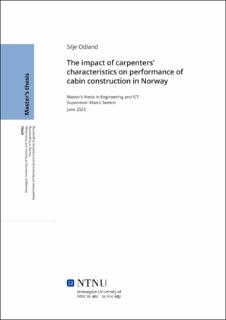| dc.contributor.advisor | Semini, Marco | |
| dc.contributor.author | Odland, Silje | |
| dc.date.accessioned | 2023-10-07T17:19:51Z | |
| dc.date.available | 2023-10-07T17:19:51Z | |
| dc.date.issued | 2023 | |
| dc.identifier | no.ntnu:inspera:146717033:34107196 | |
| dc.identifier.uri | https://hdl.handle.net/11250/3095077 | |
| dc.description.abstract | Bakgrunn: Lav produktivitet er en av byggebransjens mest kritiske utfordringer. Arbeidsproduktiviteten påvirker lønnsomheten til byggefirmaer betydelig noe som gjør det viktig å forstå faktorer som påvirker arbeidernes produktivitet. Forståelsen kan bidra til å utvikle strategier for å redusere ineffektivitet og administrere arbeidsstyrken i byggebransjen, som igjen gjør bedriftene mer konkurransedyktige og øker sjansen for å overleve i en svært konkurranseutsatt sektor.
Formål: Denne oppgaven har som mål å undersøke hvordan snekkerenes egenskaper, spesielt alder, utdanning/erfaring og språk/nasjonalitet, påvirker ytelsen til hyttebygging.
Design: Formålet blir oppnådd gjennom et litteraturstudie som undersøker hvordan alder, utdanning/ erfaring og språk/ nasjonalietet kan påvirke ytelsen til et byggeprosjekt. Deretter ble det lagd hypoteser basert på de teoretiske funnene og gjennomført en case studie med dataanalyser for å teste hypotesene.
Funn: En analyse av 288 hytteprosjekter fant at antall man-hours og konstruksjonsdager har et statisktisk signifikant forhold med antall år i bedriften. Alder og nasjonalitet ble ikke funnet signifikant. I tillegg var det interessante funn ved en nylig innført monteringsanvisning, hvor prosjektene som brukte anvisningen i snitt brukte 11% færre timer og 13% færre dager. | |
| dc.description.abstract | Background: Low productivity is one of the construction industry's most critical challenges. Labor productivity significantly affects the profitability of construction companies, which makes it important to understand factors that affect worker productivity. The understanding can help develop strategies to reduce inefficiencies and manage the workforce in the construction industry, which in turn makes companies more competitive and increases the chance of survival in a highly competitive sector.
Purpose: This thesis aims to investigate how construction workers' characteristics, especially age, education/ experience, and language/ nationality, affect the performance of cabin construction.
Design: The purpose is achieved through a literature study that examines how age, education/ experience, and language/ nationality can affect the performance of a construction project. Hypotheses were then made based on the theoretical findings, and a case study with data analysis was carried out to test the hypotheses.
Findings: An analysis of 288 cabin projects found that the number of man-hours and construction days has a statistically significant relationship with the number of years in the company. Age and nationality were not found to be significant. In addition, there were interesting findings with a recently introduced assembly instruction, where the projects that used the instruction used an average of 11% fewer hours and 13% fewer days. | |
| dc.language | eng | |
| dc.publisher | NTNU | |
| dc.title | The impact of carpenters’ characteristics on performance of cabin construction in Norway | |
| dc.type | Master thesis | |
